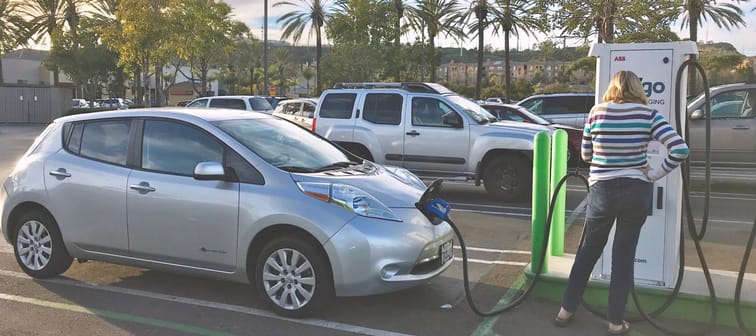With the cost of gas increasing more than 60% over the past year, according to AAA, electric cars are beginning to look more and more like the budget-friendly option.
But anyone hoping to cut down on the traditionally high barrier to entry for EVs will discover that buying used doesn't offer the discount it once did.
Walch gets his inventory through used-car auctions. Even there, he says, used vehicles are selling for more than their retail book value — and he doesn’t expect them to get cheaper soon.
“It's just going to continue to get worse.”
More electric cars coming out, but fewer to buy
Though car manufacturers are putting more electric cars on the market, and rapid advances in technology mean batteries can stay strong for many years, it can still be a challenge to find used electric vehicles for sale.
That’s thanks in part to the same global chip shortages cutting off the supply of new gas-powered cars, forcing more buyers into the used market. However, it’s also a result of increased interest, as more people look to reduce their greenhouse-gas emissions and cut down on rising fuel costs.
“People are becoming more aware that it's a useful mode of transportation. We don't get asked the same dumb questions we used to get asked, like we used to have to start people like at square one just like a baby, like how an electric car works,” Walch says.
Now, selling them is easy: A used electric vehicle typically sells the day it goes on the lot. The hard part is getting them in. At time of writing, Walch has 25 used EVs in his inventory; normally he would have 60 or 70.
That crunch is being seen across the country, says Liz Najman, communications manager at Recurrent, an organization that works to educate drivers and increase EV adoption.
The average price of a used electric vehicle went up 25% between March 2021 and March 2022, according to Recurrent’s data.
“There are a lot of people who are shopping for used EVs whose preference is a new EV who are having to turn to the second-hand market because the inventory is really not there for new cars,” Najman says.
More: When is the best time to buy a car?
Meet Your Retirement Goals Effortlessly
The road to retirement may seem long, but with WiserAdvisor, you can find a trusted partner to guide you every step of the way
WiserAdvisor matches you with vetted financial advisors that offer personalized advice to help you to make the right choices, invest wisely, and secure the retirement you've always dreamed of. Start planning early, and get your retirement mapped out today.
Get StartedOld fears with electric cars persist
While more people are buying used EVs (enthusiastically or not), Recurrent’s research shows they still have the same old worry: that the battery won’t hold its charge after years of use.
“Most of the country — even people who don't like the idea of electric vehicles — are wise to the fact that they use lithium ion batteries, which is the same thing that's in your phone,” Najman says.
“And everybody kind of has the experience that you get a phone and the battery lasts for two days, and then 18 months in, you're suddenly charging your phone all the time and you're losing battery really quickly.”
But Recurrent’s data shows the degradation isn’t as bad as many people fear.
“We have cars that are almost 10 years old that we track, and they show, like, less than 10% degradation in the battery. So if you have a car that's originally rated at 250 miles by the EPA (Environmental Protection Agency), you're still getting at least 200 miles reliably.”
Depending on how an owner drives, stores and charges their car, they can make the battery life better or worse. However, batteries in the U.S. must be covered under warranty for at least eight years, or 100,000 miles, under federal regulations.
Cost concerns turn upside down
Traditionally, electric vehicles haven’t held their value as well as gas-powered cars.
On average, EVs (excluding Teslas) traditionally depreciated up to 52% over three years, according to research by iSeeCars. The average for all vehicles is 39%.
Much of that is attributed to the federal and state tax credits applied when buying new and that the technology for EVs is rapidly changing.
But in this market, that’s not been the case.
“We're seeing people make almost $10,000 reselling a gently used car,” Najman says.
While supply shortages are the biggest factor in today’s price hikes, Walch also believes pre-owned electric vehicles were simply undervalued in the past.
“We were selling cars like Nissan Leafs, trying to give them away, with nobody ringing the phone for $10,000, $11,000 for a low-mileage couple-year-old car just a couple of years ago. That same car now is sold in a day for twice the price,” he says.
Stop overpaying for home insurance
Home insurance is an essential expense – one that can often be pricey. You can lower your monthly recurring expenses by finding a more economical alternative for home insurance.
SmartFinancial can help you do just that. SmartFinancial’s online marketplace of vetted lenders allows you to quickly shop around for rates from the country’s top insurance companies, and ensure you’re paying the lowest price possible for your home insurance.
Explore better ratesSeeking out savings
Though the upfront cost of an electric car is typically higher than a gas-powered equivalent, owning one can be a lot cheaper. Research shows the operating and maintenance costs of an electric vehicle are about 50% lower, which can save drivers thousands of dollars over the years.
And there are ways to bring down that upfront cost. If you can get your hands on a new vehicle, the federal tax credit can save a buyer up to $7,500.
The credit doesn’t apply to used EVs, but there are plenty of state and local tax credit programs that will.
More: Do electric vehicles cost more to insure?
What else to consider when buying a used electric car
While many people interested in used EVs will have an idea of what they want in a vehicle, make sure to consider a few special factors before paying a premium price for one.
Be wary of the age of the vehicle you want to purchase. After all, the older it is, the more likely the battery has degraded, and older EVs didn’t start out with the battery range most models have today.
The 2015 Nissan Leaf, for example, only got 84 miles per charge at the time, while the 2019 Leaf started out with a range of 150 miles, according to the EPA.
Additionally, if the car has more than 100,000 miles on it or is older than eight years, the warranty will likely have expired. In the unlikely event that the battery does die, or another serious issue comes up, the repair or replacement cost can be prohibitive — depending on the car, up to $20,000, according to Recurrent.
Consumers may consider installing an at-home charger to save money on power. Keep in mind the upfront cost for a charger can vary, but there are plenty of options for level 1 and level 2 chargers under $1,000. Installation and permits may have to be factored into the cost.
It’s also important to know what voltage and amperage the home’s electric panel can handle and what’s recommended for the particular vehicle.
Though drivers face a steep learning curve getting into an electric vehicle, Walch believes the benefits far outweigh the trouble.
“It's a hard jump to go from gas to electric, but it's impossible to go back to gas once you have.”
More: Find lower car insurance today
Sponsored
This 2 Minute Move Could Knock $500/Year off Your Car Insurance in 2023
Thanks to Everquote you can compare your car insurance at no extra cost to ensure you're getting the best rate. See how much you can save with Everquote today.







